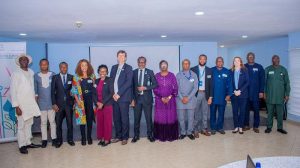The projected cost of implementing Nigeria’s Nationally Determined Contributions (NDCs) within the next seven years is in the region of $543 billion. This is as per the last Investment and Financial Flow Assessment of 2021.

The disclosure was made by the erstwhile Minister of Environment, Mohammed Abdullahi, in a keynote address he delivered at the Stakeholders’ validation meeting on the Nigeria’s NDCs & Energy Transition Plan (ETP) Implementation Framework held in Abuja from May 24 to 25, 2023.
At the heart of the Paris Agreement and the achievement of its long-term goals, NDCs embody efforts by each country to reduce national emissions and adapt to the impacts of climate change.
While stressing that the gaps for funding climate action (from both domestic and international sources) in the country is huge compared to the magnitude of the problem, Mohammed pointed out that mobilising these resources require an efficient and robust plan capable of attracting investments and funding NDCs related activities.
“The Implementation Framework will act as a tool for mobilising resources, coordination and reporting for progress towards meeting the nation’s Paris commitments. We must therefore collaborate and engage all relevant stakeholders, including government agencies, international partners, the private sector, and communities, to ensure that we achieve our targets. It is also important to ensure that our efforts are equitable, leaving no one behind, and that we maximise the opportunities for sustainable economic growth,” he said.
He described the Energy Transition Plan and the Revised NDCs as critical tools in Nigeria’s efforts to achieve its climate goals, adding: “The Energy Transition Plan provides a roadmap for the country’s transition to cleaner energy sources, while the revised NDCs set out Nigeria’s commitment to reducing its greenhouse gas emissions and adapting to the impacts of climate change. Both documents are the result of extensive consultations with stakeholders and reflect the collective aspirations of Nigerians towards a sustainable future.”
He pointed out that the NDC Implementation Framework Validation meeting and NDC-ETP Alignment Stakeholder Engagement workshops provide a platform for all stakeholders to review and provide feedback on Nigeria’s efforts towards meeting its climate commitments. This, he added, is a crucial step towards achieving stated climate goals and ensuring a sustainable future for generations to come.
His words: “Nigeria is not immune to the impacts of climate change. We have seen the devastating effects of extreme weather events such as flooding, drought, and desertification in various parts of the country. These events have not only resulted in the loss of lives but also caused significant economic losses. It is therefore imperative that we take proactive measures to address the root causes of climate change.”
Mr. Charles Ikeah, the Director Overseeing Office of Permanent Secretary, Federal Ministry of Environment, described climate change as one of the greatest challenges facing the planet today, adding that Its impacts are being felt around the world, with devastating consequences for people and the environment.
“Nigeria, like many other countries, is not immune to these impacts, and we have a responsibility to take action to address the root causes of climate change,” he stated, pointing out that the NDCs Implementation Plan Validation meeting and NDC-ETP Alignment Stakeholder Engagement Workshop are important opportunities for Nigerians to come together as stakeholders and review the nation’s efforts towards meeting its climate commitments.
“It is a chance for us to assess the progress made so far, identify gaps, and chart a way forward towards achieving our climate goals. The meeting is also an opportunity for us to engage in constructive dialogue and collaboration, as we work towards implementing Nigeria’s NDC. We must all work together, including government agencies, civil society organisations, the private sector, and communities, to ensure that our efforts are inclusive, transparent, and effective,” Ikeah stressed.
Dr. Iniobong Abiola-Awe, Director, Department of Climate Change in the Federal Ministry of Environment, disclosed that, Nigeria, like many other countries, has made commitments under the Paris Agreement to reduce its greenhouse gas emissions and adapt to the impacts of climate change.
According to her, the development of the NDCs Implementation Framework is a critical step in ensuring that Nigeria can effectively implement its climate commitments and achieve its climate goals. She described the process as a collaborative effort involving relevant MDAs.
“The meeting is an opportunity to review and validate the NDCs Implementation Framework, which outlines the key elements of Nigeria’s approach to NDCs implementation. We will discuss the framework’s key features, including planning, financing, and explore how best to ensure stakeholder engagement and coordination across sectors,” she said.
Nigeria’s revised NDCs contain both mitigation and adaptation measures in priority sectors that include: Agriculture (land & forestry), Transportation, Oil and Gas, Energy, Industry, Waste, and Water.
Beyond the Paris Agreement, Nigeria has committed to net-zero emissions by 2060, in line with the Energy Transition Plan (ETP), which was launched in August 2022, and the Long-Term Low Emission Development Strategy, underway.
The Paris Agreement on Climate Change was signed in 2015 with the aim of limiting global warming to well below 2 degrees Celsius above pre-industrial levels and pursuing efforts to limit the temperature increase to 1.5 degrees Celsius.
Nigeria submitted an ambitious updated NDC as its commitment to the Paris Agreement in July 2021. The updated NDCs commit Nigeria to reduce emissions by 47% from 2018 BAU (business as usual) projections, conditional on international support and 20% reductions through unconditional measures by 2030.
